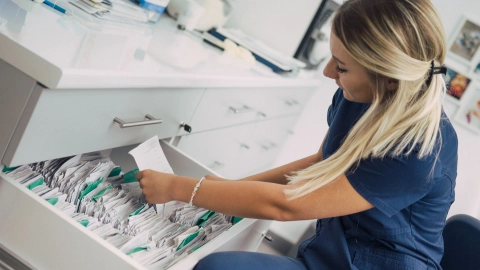Health care Patient's receipt
Patients are entitled to transparency in relation to their treatments, including the costs. The patient's receipt helps in this respect, in terms of the work doctors have done.
At a glance
- People covered by statutory health insurance are entitled to a patient's receipt.
- However, as a patient you are not given the patient's receipt automatically, but rather have to ask for it.
- You can ask for the receipt free of charge after every visit to the doctor, but quarterly receipts are also possible.
- The entitlement does not just apply to general practitioners, specialist doctors, and dentists, but also to stays in hospitals.
- The information must be presented clearly and be comprehensible also to laypersons.
- The statutory health insurance provider also has to provide information about work that doctors have done.

What are patients’ receipts?
Patients are entitled to transparency in relation to their treatments. Firstly, in terms of your doctor's measures, diagnoses and findings: your entitlement, as a patient, to look at your record, for example, helps here. But also in terms of the work that doctors charge the health insurance providers for. The patient's receipt helps give you clarity about this.
You are legally entitled to the patient's receipt. This means that your doctor must issue you with this receipt if you ask for it. The information in it must be presented clearly and be comprehensible also to laypersons.
Which doctors and facilities issue a patient's receipt?
When people covered by statutory health insurance are treated by doctors affiliated to the statutory health care system they are entitled to a patient's receipt. This entitlement applies to general practitioners, specialist doctors and dental practices.
You can get the patient's receipt free of charge upon request after a visit to a doctor. However, you can also opt for a patient's receipt to be issued every quarter. The medical practice concerned must issue patient receipts every quarter, at most four weeks after the end of the quarter in which the services have been provided. As the insured person, you need to pay a fixed sum of one Euro plus postage costs to the practice for a quarterly receipt.
Hospitals, too, must issue the insured person a patient's receipt free of charge, if requested, at most four weeks after treatment has finished. The hospital should give it to the patient the day they are discharged, or send it by post. You are also entitled to a receipt if a hospital treats you as an outpatient.
What information should a patient's receipt include?
A patient's receipt must be presented clearly and include the following details:
- your personal details (name and address)
- date or period of treatment
- the tariff codes charged against
- the work done (worded so that laypersons can understand it)
- the likely costs
Hospitals’ patients’ receipts also include:
- the main diagnosis
- the type and amount of the charges in the receipt
- the amount the insured person must pay privately
- dates of admittance, discharge and any transfer
What options are there to find out about the work that has been done?
If you have missed the deadline for requesting a patient's receipt from a doctor or hospital, you have another way of getting information: because, if requested, the statutory health insurance provider is also obliged to retrospectively provide information about the work done and its costs.
What can be done in case of doubt about a patient's receipt?
If you find details or work on your patient's receipt which, in your opinion, was not done, there may be an error or it may even be a fraudulent invoice. You should then contact your health insurance provider. The Office for Combating Misconduct in the Health Sector (“Stelle zur Bekämpfung von Fehlverhalten im Gesundheitswesen”) at the National Association of Statutory Health Insurance Funds (GKV-Spitzenverband) can also be contacted.
For more information, visit the GKV-Spitzenverband website.
- Bundesministerium für Gesundheit. Patientenquittung. Aufgerufen am 22.04.2020.
- Bundesministerium für Gesundheit. Publikation: Ratgeber für Patientenrechte. Aufgerufen am 21.04.2020.
- GKV-Spitzenverband. Patientenquittung, Ärzte, Krankenhäuser, Krankenkassen. Aufgerufen am 22.04.2020.






